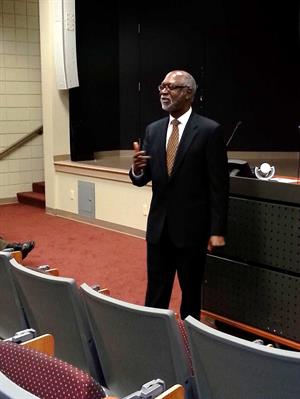Retired Ambassador Offers Lessons in Globalization During Claflin Visit
Dec 27, 2013
 If there is one thing retired U.S. Ambassador James Irvin Gadsden has witnessed and experienced in his decades of Foreign Service work, it’s the effects of globalization.
If there is one thing retired U.S. Ambassador James Irvin Gadsden has witnessed and experienced in his decades of Foreign Service work, it’s the effects of globalization.
“There is, I think, a wide of spectrum of opportunities for you, in the future, especially given technology,” he told an audience of mostly mass communication majors during a recent visit to the University as part of Claflin’s Visionary Leadership Institute.
“As we amass communications interest, especially in the intelligence field, and certainly in foreign fields and in diplomacy, there is certainly a great need for people who are specializing in journalism and in communications,” Gadsden continued.
He said opportunities abound not only for communications majors, however – any and all majors should be able to think outside of the box of their traditional academic degrees to find a niche on the world stage.
“Think about working for a global economy,” Gadsden said. “Because business is now so international, think about how you might work with one of those companies. How can you bring what you are studying to the service of international companies? Think of how that work might be done in a global setting. Look for opportunities while you’re in college or graduate school. Intern overseas. Put back into your planet so that you become someone who can operate all over the world.
“See your field not just from a local perspective, but from a global perspective, because that’s where things are going rapidly. It makes you far more marketable. Globalization – that’s what it’s all about.”
Gadsden, a Charleston native, entered the Foreign Service in 1972 after receiving a bachelor’s degree in economics from Harvard University and a master’s degree in East Asian studies from Stanford University. He was a Mid-Career Fellow at Princeton University’s Woodrow Wilson School of Public and International Affairs, where he continued graduate studies in economics.
During his presentation, Gadsden talked about what it’s like being a U.S. diplomat, representing America on the president’s behalf on foreign soil. Approximately 192 U.S. embassies operate around the world.
“It’s a miniature U.S. government transported to a foreign capital to conduct the United States’ business … with countries all around the world and with other organizations,” he said. “Diplomacy is near to my heart.”
Gadsden currently serves as Diplomat-in-Residence and lecturer in public and international affairs at Princeton University’s Woodrow Wilson School of Public and International Affairs in Princeton, New Jersey. His last post before retiring from the U.S. Foreign Service was ambassador to Iceland, a post he took just months before the start of the Iraq War.
“When you have a war, it doesn’t just hurt the U.S. presence in that country,” he said. “The entire U.S. government’s presence all over the world is affected.”
Being a global worker, a global thinker and a global leader is possible no matter what your field of study is, Gadsden said.
“You can do this, but you need to think broadly and have a vision,” he said. “Don’t think about what is – think about what could be. Find a dream that inspires you, and then go after it.”